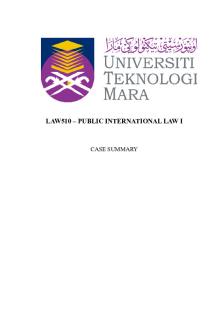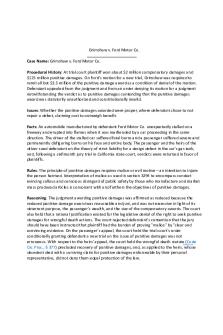Case Summary - Barcelona Traction, Light and Power Co Case (Belgium v Spain) (1970) ICJ Rep PDF

| Title | Case Summary - Barcelona Traction, Light and Power Co Case (Belgium v Spain) (1970) ICJ Rep |
|---|---|
| Course | Public International Law 1 |
| Institution | Universiti Teknologi MARA |
| Pages | 4 |
| File Size | 245.5 KB |
| File Type | |
| Total Downloads | 102 |
| Total Views | 177 |
Summary
Barcelona Traction, Light and Power Co Case (Belgium v Spain) (1970) ICJ Rep p3...
Description
LAW510 – PUBLIC INTERNATIONAL LAW I
CASE SUMMARY
Case: Barcelona Traction, Light and Power Co Case (Belgium v Spain) (1970) ICJ Rep p3 Facts Belgian Government filed with the International Court of Justice an Application against the Spanish Government seeking reparation for damage allegedly caused to the Barcelona Traction, Light and Power Company, Limited, a holding company incorporated in Toronto, Canada in 1911 to develop a system to produce and distribute electric power in Catalonia (Spain). It formed a number of subsidiary companies, of which some had their registered offices in Canada and the others in Spain. In 1948 three Spanish holders of bonds of Barcelona Traction petitioned that court of Reus (Province of Tarragona) a Spanish Court for a declaration of bankruptcy for Barcelona Traction, , on account of failure to pay the interest on the bonds. On 12 February 1948, a judgment was given declaring the company bankrupt and ordering the seizure of the assets of Barcelona Traction and of two of its subsidiary companies. The Spanish court appointed a receiver, and the Traction Company lost the capacity to administer any of its properties. The principal managers of the company were dismissed, new directors were appointed, new shares were issued of the Spanish subsidiaries of Barcelona Traction, and these shares were sold by public auction to a newly founded Spanish company. New shares of the subsidiary companies were created, which were sold by public auction in 1952 to a newly-formed company, Fuerzas Electricas ~de Cataluina, S.A. (Fecsa), which thereupon acquired complete control of the undertaking in Spain. Following several years of diplomatic representations on behalf of Barcelona Traction, also by Canada, Great Britain, and the United States, Belgium initiated proceedings against Spain in the World Court, alleging essentially 'creeping expropriation' and claiming some $90 million in reparations, or 88 percent of this sum representing the Belgian share interest in the company.
The Belgian Government filed the first Application with the Court against the Spanish Government in 1958. In 1961 it gave notice of discontinuance of the proceedings, with a view to negotiations between the representatives of the private interests concerned, and the case was removed from the Court’s General List. The negotiations having failed, the Belgian Government on 19 June 1962 submitted to the Court a new Application. The Court found that in 1948 Barcelona Traction, which had not received a judicial notice of the bankruptcy proceedings, and was not represented before the Reus court, took no proceedings in the Spanish courts until 18th June and thus did not enter a plea of opposition against the bankruptcy judgment within the timelimit of eight days from the date of publication of the judgment laid down in Spanish legislation. Belgium sought compensation for the damage claimed to have been caused to its nationals, shareholders in the Barcelona Traction, Light and Power Company, Ltd., as the result of acts contrary to international law said to have been committed by organs of the Spanish State. Spain, on the other hand, submitted that the Belgian claim should be declared inadmissible or unfounded. Spain objected to the Court's jurisdiction, on the basis that the Barcelona Traction Company was not a Belgian company, and that Belgium had no right to exercise diplomatic protection, including standing in the World Court, on behalf of mere shareholders. In other
words, Spain objected that since the injury was to the company and not the shareholders, Belgium had no right to bring the claim.
Issue: 1. Does Belgium have the Jus standi (right to bring an action to court) to exercise diplomatic protection of shareholders in a Canadian company?
Judgement The court rejected the Belgian claim on the grounds that it did not have a legal interest in the matter. Although shareholders may suffer if wrong is done to a company, it is only the rights of the company that have been infringed and thus entitle it to institute action. If, on the other hand ( as did not happen in the Barcelona case), the direct rights of the shareholders were affected, for example, as regards dividends, then only they could have an independent right of action but otherwise, only if the company legally cease to exist. It should be noted that, in some cases, the State of incorporation of a company may have little interest in protecting the company, while the national State of the shareholders has considerable interest in so doing. The court denied the existence under customary international law of an inherent right for the national State of shareholders in a foreign company to exercise diplomatic protection. The Court considered whether there might not be, in the present case, special circumstances for which the general rule might not take effect. Two situations need to be studied: (a) the case of the company having ceased to exist, and (b) the case of the protecting State of the company lacking the capacity to take action.
As regards the first of these possibilities, the Court observed that whilst Barcelona Traction had lost all its assets in Spain and been placed in receivership in Canada, it could not be contended that the corporate entity of the company had ceased to exist or that it had lost its capacity to take corporate action. So far as the second possibility was concerned, it was not disputed that the company had been incorporated in Canada and had its registered office in that country, and its Canadian nationality had received general recognition. The Canadian Government had exercised the protection of Barcelona Traction for a number of years. If at a certain point the Canadian Government ceased to act on behalf of Barcelona Traction, it nonetheless retained its capacity to do so, which the Spanish Government had not questioned. Whatever the reasons for the Canadian Government’s change of attitude, that fact could not constitute a justification for the exercise of diplomatic protection by another government. It had been maintained that a State
could make a claim when investments by its nationals abroad, such investments being part of a State’s national economic resources, were prejudicially affected in violation of the right of the State itself to have its nationals enjoy a certain treatment. But, in the present state of affairs, such a right could only result from a treaty or special agreement. And no treaty or special agreement of such a kind was in force between Belgium and Spain.
If we consider reasons of equity, a State should be able to take up the protection of its nationals, shareholders in a company which had been the victim of a violation of international law. The Court considered that the adoption of the theory of diplomatic protection of shareholders as such would open the door to competing claims on the part of different States, which could create an atmosphere of insecurity in international economic relations. In the particular circumstances of the present case, where the company’s national State was able to act, the Court was not of the opinion that jus standi was conferred on the Belgian Government by considerations of equity....
Similar Free PDFs

FC Barcelona Case-1 - Tutorials
- 2 Pages

READ v Lyons - Case summary
- 2 Pages

Clayton v Ramsden case summary
- 2 Pages

Kogan v Martin/Case Summary
- 3 Pages

Lumley v Gye - Case summary
- 21 Pages
Popular Institutions
- Tinajero National High School - Annex
- Politeknik Caltex Riau
- Yokohama City University
- SGT University
- University of Al-Qadisiyah
- Divine Word College of Vigan
- Techniek College Rotterdam
- Universidade de Santiago
- Universiti Teknologi MARA Cawangan Johor Kampus Pasir Gudang
- Poltekkes Kemenkes Yogyakarta
- Baguio City National High School
- Colegio san marcos
- preparatoria uno
- Centro de Bachillerato Tecnológico Industrial y de Servicios No. 107
- Dalian Maritime University
- Quang Trung Secondary School
- Colegio Tecnológico en Informática
- Corporación Regional de Educación Superior
- Grupo CEDVA
- Dar Al Uloom University
- Centro de Estudios Preuniversitarios de la Universidad Nacional de Ingeniería
- 上智大学
- Aakash International School, Nuna Majara
- San Felipe Neri Catholic School
- Kang Chiao International School - New Taipei City
- Misamis Occidental National High School
- Institución Educativa Escuela Normal Juan Ladrilleros
- Kolehiyo ng Pantukan
- Batanes State College
- Instituto Continental
- Sekolah Menengah Kejuruan Kesehatan Kaltara (Tarakan)
- Colegio de La Inmaculada Concepcion - Cebu










